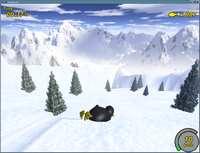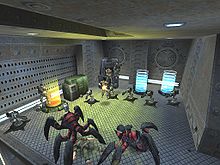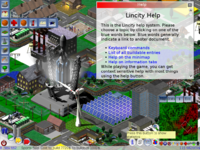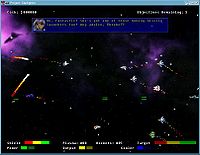- Open source video game
-
 FlightGear flight simulator
FlightGear flight simulator
An open source video game, or simply an open source game, is a video game whose source code is open source. They are often freely distributable and sometimes cross-platform compatible. Many are included in Linux distributions as a result.[1]
Open source games which are free software and contain exclusively free content are called free games. Most free games are open source, but not all open source games are free software; some open source games contain proprietary non-free content.
Contents
Background
In general free games are developed by small groups of people in their free time, without aiming for profit. Some free games are based on formerly proprietary projects, whose source code was released as free and open source software and game data as free and open content.[2] An example is Warzone 2100.[3] Almost all free games are volunteer run projects, and as such free game developers are principally hobbyists and enthusiasts. The consequence of this is that most games take many years to mature and that means there are only a few complete high quality free games. One of the challenges to building high quality content for games is it often requires expensive tools like 3D-modeller or a toolset for level design.[4] As open source applications like Blender mature and professional tools like GtkRadiant are published under open licenses, this is becoming less of an issue.
History
Beginnings and early games
Just as in most other forms software, free software was an unconscious occurrence during the creation of early computer games, particularity for earlier Unix games. These are mostly original or clone arcade games and text adventures. A notable example of this is BSD Games, a collection of interactive fiction titles.[5] Game fan communities such as the modding community do include some aspects of free software, such as sharing mods across community sites, sometimes with free to use media made for the modification. With the rise of proprietary software in the mid to late 1980s, games became more and more proprietary. However, this also led to the first deliberately free games such as GNU Chess of the GNU Project, part of whose goal is to create a complete free software system, games included.[6] More advanced free gaming projects emerged, such as NetHack and Netrek, many still developed and played today in front-ends such as Vulture's Eye.
As PC gaming began to rise in the late 1980s and early 1990s, free gaming also advanced. More complicated games utilizing the X Window System for graphics started to emerge, most beginning with the signature letter X. These included XBill, XEvil, xbattle, Xconq and XPilot. XBill is notable as one of the earliest free gaming titles to feature an activist theme of halting proprietary software adoption. This theme was in echoed in later titles such as FreeDroidRPG. XEvil followed the development cycle of many early pieces of free software, having originally been developed as a university project, although it was freeware for a while. The game was also one of the first free titles to feature controversial subject matter such as graphic violence and drug use.[7] Rocks'n'Diamonds is another earlier free software game, and one of the first for Linux.
The FreeCiv project was started in 1995 and gave rise to another new style of free game development. Similar to the cooperative nature of the Linux kernel development, FreeCiv was extended by many volunteers, rather than only one or two authors.[8] It had started out as a small university student project but then branched out into its current form and is still being developed today. FreeCiv also proved to be one of the earliest hit free software games, and was among the first to be included with Linux distributions, a system commonly known now as a source of peer review or selection of quality for free gaming projects, though magazines, news sources and websites have also started noting free games, often in listings.[9][10][11][12] FreeCiv and other archetypes have led to the development of many other clones of popular proprietary games.[13] BZFlag, first worked on a few years earlier, is another project that had humble beginnings but grew into a popular and heavily developed project.
3D games and source releases
Proprietary games such as Doom and Descent brought in the age of three-dimensional games in the early to mid 1990s, and free games started to make the switch themselves. Tuxedo T. Penguin: A Quest for Herring by Steve Baker, a game featuring the Linux mascot Tux, was an early example of a three-dimensional free software game. He and his son Oliver would later create other popular 3D free games and clones such as TuxKart and contribute to those by other developers such as Tux Racer. The Genesis3D engine project and the Cube project also spawned other 3D free software engines and games. FlightGear is another good example, especially noting that it is not a shooter engine but a flight simulator.[14]
id Software, an early entrant into commercial Linux gaming, would also prove to be an early supporter of free gaming when John D. Carmack released the source code for Wolfenstein 3D and Doom, first under a custom license and then later the GPL. This was followed by the release of Quake engine, id Tech 2 and id Tech 3. This led not only to source ports that allowed the playing of the non-free games based on these engines (plus fan added enhancements)[15] on free engines and systems, but also to new free games such as Freedoom, Nexuiz, Tremulous, and OpenArena.[16] Freeware games, such as CodeRED: Alien Arena, Warsow, World of Padman and Urban Terror,[17] have also taken advantage of these free engines and sometimes have given code back to the community. id Tech 4 is expected to be released as free software, even amongst patent concerns from Creative Labs. Development and editing tools are also commonly released freely, such as GtkRadiant.[18]
id partners and related, such as Raven Software, Bungie Software and 3D Realms, as well as several of the developers who participated in the Humble Indie Bundle,[19] have also released code and it is now accepted practice for some mainstream game developers to release legacy source code.[20] Formerly proprietary games such as Jump 'n bump, Meritous, Warzone 2100, HoverRace and Abuse have even been entirely released freely, including multimedia assets and levels. Some games are mostly free software but contain some proprietary content such as the Cube sequel, Sauerbraten or the former Quake III Arena mod Smokin' Guns, but some developers desire and/or work on replacing these with free content.[21] Primarily proprietary developers have also helped free gaming by creating free libraries. Loki Software helped create and maintain the Simple DirectMedia Layer and OpenAL libraries and Linux Game Publishing created and maintain the free network layer Grapple. LGP also avoids publishing games similar to popular free titles.[22] Many libraries/infrastructures have been created without corporate assistance however, such as the online gaming system GGZ Gaming Zone. In addition, various game creators are free software such as the ZZT remake MegaZeux, versions of Game Editor, the Game Maker inspired G-Creator, and ZGameEditor.
Rise in popularity and diversity
Individuals and teams have continued creating many popular free software games, starting really in the late 1990s to the present day. Many of these are clones such as Pingus (Lemmings clone), SuperTux and Secret Maryo Chronicles (Super Mario Bros-inspired),[23] WarMUX and Hedgewars (Worms) as well as Frets on Fire, which is a recreation of Guitar Hero. A number of these games and those mentioned earlier and later in this section have even received mainstream press coverage[24][25] and have helped to establish free gaming as a moderately popular past time, even if mostly enjoyed by Linux and BSD users. Frozen Bubble, originally a clone of Puzzle Bobble, has become a classic known for its addictive gameplay and winner of many Linux Journal reader's choice awards.[26][27][28] These games and others have also helped expand the prevalent Tux genre which started with titles and like A Quest for Herring and are related to the activist content of games like XBill. More unique games like Neverball, another 3D title, have also been able to carve out their own niches.[29][30]
Strategy games have also been a prevalent force in free software gaming,[31] partly due to the lack of proprietary strategy games for free software operating systems as compared to other genres like first-person shooters and role playing games.[32] FreeCiv began the trend, and was followed by other clone titles like FreeCol, LinCity and Widelands. The Stratagus project began as an attempt to recreate the proprietary Warcraft II engine, under the name FreeCraft. Blizzard Entertainment sent a cease and desist letter in 2003 over the use of the name "craft" in comparison to Warcraft and StarCraft.[33] Though the earlier free software strategy game CRAFT: The Vicious Vikings shared the name "craft" without controversy.[34]
With the new, legally inoffensive name Stratagus, the team began work on a new strategy game called Bos Wars. Development on this game still continues, as well as the modern Warcraft II port Wargus. Other games branched out of the engine project as well such as the Battle for Mandicor and Astroseries projects and the StarCraft port attempt Stargus. After the Stratagus example, other real time strategy games were developed, such as Globulation 2, which experiments with game management mechanics, 0 A.D., a former freeware project, and the 3D projects Spring and Glest.[35] In addition, the more economically driven strategy game Widelands bases itself upon the proprietary Settlers franchise.
Racing games, another uncommon Linux commercial genre, has also seen development with TORCS and VDrift, as well as the Mario Kart-inspired SuperTuxKart. WorldForge is another example of increasing diversification, in its attempt to create a free massively multiplayer online role playing game. Free software is also the main source for educational and children's software specifically for Linux, usually utilizing the child appeal of the Tux mascot, such as Tux Paint, Tux, of Math Command, Tux Typing and related efforts.[36]
Greater organization
Despite its initial roots as small private projects, the free software gaming scene has been becoming progressively more organized. The roots of this even go back as far as the games created for the GNU Project and to the original larger-scale free software projects like FreeCiv. Still, for the most part free game development had very little organization throughout its history. Popular games were generally separate efforts, except for instances of people working on them known for other projects such as Ingo Ruhnke, Bill Kendrick and Steve Baker. Games were commonly found in directories such as The Linux Game Tome and Freshmeat and hosted on sites like SourceForge, but they were largely only ever brought together in the form of disorganized lists. Other projects and games existed purely on small isolated personal or project websites, often unknown and ignored.
The launch of the GNOME and KDE desktop projects in the late 1990s organized application and, to a certain extent, game development. Both attempts to create a more usable Linux desktop attracted volunteers to make utilities to that end. These programs included games, mostly recreations of small games like Minesweeper or Solitaire that come with Microsoft Windows, arcade classics and the like, games from combined packs such as the Microsoft Windows Entertainment Pack, and occasionally original ideas. The variety and amount of these games, and other free games easily found in software repositories, have even led some to call GNOME or KDE-enabled Linux a better option for out of the box casual gaming than Microsoft Windows.[37] Examples include gbrainy, Gnomine and KAtomic. Many such games are packaged into GNOME Games and kdegames. The availability of free game engines, such as Stratagus, Pygame, Sauerbraten and most prominently ioquake3 have also helped unify free software development by making the engine projects themselves hubs of activity for games that make use of them.
The Battle for Wesnoth project was started in 2003 and quickly became popular to both players and editors. It also showcased some new ideas when it came to free game development. Like FreeCiv before it, it utilized the efforts of the gaming and free software community and their code, levels and artwork contributions but it also accepted storyline contributions and ideas for the game's entire fictional universe. The game's canon is maintained through review and discussion over which submitted campaigns become official, thus setting up a model for community input and organized results.[38] This helped the game grow in scale and popularity to the point of being almost saga-like in scope. In addition, the project is worked on by many well-known free programmers, artists, designers and musicians such as the co-founder of the Open Source Initiative Eric S. Raymond,[39] and Linux kernel hacker Rusty Russell.[40][41] Vega Strike has similarly allowed its community to expand the game and the surrounding lore while maintaining canon consistency.
Hubs and development teams
The general lack of unity and organization has created and continues to generate some controversy among the free software community, with problems of "reinventing the wheel" by making similar clones, games and multimedia resources being cited as a notable problem to free game development.[citation needed] This is especially taking up more notice as other problems are corrected, such as a lack of tools, libraries, artists and coders. A more central knowledge bank, texture library, and discussion area have been called for several times.[citation needed]
Traditionally free software video games were developed as individual projects, some small scale and others larger scale. Programmers and other developers did often work on other projects, but the whole system was very unlinked.[citation needed] More recently free software development teams have started appearing, groups that function like software companies and create multiple pieces of work. Examples include the developer Parallel Realities, which have released the games Project: Starfighter, The Legend of Edgar, Blob Wars: Metal Blob Solid, as well as its sequel, Blob Wars: Blob and Conquer.[42]
In recent years, content repositories such as OpenGameArt.org and The Freesound Project have enabled developers to easily find appropriately-licensed content rather than relying on programmer art. Such content is often under Creative Commons licenses or those in the GNU General Public License family, easily facilitating use by most free software projects. Though there are also sometimes licensing issues, such as with the use of the Sampling Plus license by Freesound which is not considered free by the Free Software Foundation or open by the Open Source Initiative.
The Linux Game Tome "Game of the Month" team is a group of game developers that revamp old free software games. Some examples include the transformation of TuxKart into the more modern SuperTuxKart, work on Pingus and SuperTux and LinCity-NG, an updated version of LinCity with superior graphics.[43]
See also
- List of open source games
- Independent video game development
- Freeware games
References
- ^ Debian Package Games
- ^ Linux games from Freshmeat
- ^ Warzone 2100 Resurrection project about page
- ^ Shawn Hargreaves (July 1999). "Playing the Open Source Game". http://www.talula.demon.co.uk/games.html#Random%20advice%20for%20game%20hackers.
- ^ Ghost of Fun Time's Past - Linux Journal
- ^ Linux and GNU - GNU Project
- ^ XEvil at Home of the Underdogs
- ^ "''Building Freeciv: An Open Source Strategy Game'', by Howard Wen, on linuxdevcenter.com, Nov 21, 2001". Linuxdevcenter.com. http://www.linuxdevcenter.com/pub/a/linux/2001/11/21/freeciv.html. Retrieved 2009-04-14.
- ^ Top 100 Free Games for Linux - Linux Links
- ^ Sixteen Free Games - PC Mech
- ^ Top 5 Best Free Open Source Games - APC Mag
- ^ Six Free Must Have Games for Your Mac - Softpedia
- ^ Open Source Mac Gaming: 10 Free Games Reviewed - TidBITS
- ^ Top 5 Free Linux Games, Download Now - Ixibo.com
- ^ How To Play Doom, Heretic, Hexen & Strife in Linux (Free) - Simple Thoughts
- ^ Free Quake: Open Source Gamer's Guide to Free Games - Associated Content
- ^ Comparison of Free Software Shooters - Linux-Gamers.net
- ^ GPL GtkRadiant Blue's News, February 17, 2006
- ^ Open source can juice the video game market ZDNet, May 14, 2010 (Article by Dana Blankenhorn)
- ^ Open Source Mac Gaming: 10 Free Games Reviewed - TidBITS
- ^ "Entretien avec l’équipe de Smokin’Guns (French/English interview) - JeuxLinux". http://www.jeuxlinux.fr/a269-Entretien_avec_lequipe_de_SmokinGuns.html. Retrieved 2010-01-05.
- ^ Linux Game Publishing: Interview with Michael Simms - Linux Gazette
- ^ Free Platformers: Open Source Gamers Guide to Free Games Part 3 - Associated Content
- ^ Anderson, Lee (December 20, 2000). "Top 10 Linux games for the holidays". CNN.com. http://archives.cnn.com/2000/TECH/computing/12/20/linux.games.idg/index.html. Retrieved 2008-06-08.
- ^ Procrastinate with these Linux games - CNN.com
- ^ Linux Journal Reader Choice Awards 2003
- ^ Linux Journal Reader Choice Awards 2005
- ^ Linux Journal Reader Choice Awards 2009
- ^ "OpenDisc project". http://www.theopendisc.com/programs/games/. Retrieved 2009-03-30.
- ^ "Linux Format magazine archives". Archived from the original on April 4, 2008. http://web.archive.org/web/20080404100145/http://www.linuxformat.co.uk/modules.php?op=modload&name=Sections&file=index&req=viewarticle&artid=5. Retrieved 2009-03-29.
- ^ Free RTS: Open Source Gamer's Guide to Free Real Time Strategy Games - Associated Content
- ^ Open Source Mac Gaming: 10 Free Games Reviewed - TidBITS
- ^ Stratagus - LinuxDevCenter
- ^ Mention of Craft in Linux Journal
- ^ Top 10 Free Linux Games in 2009 - Simple Thoughts
- ^ Teaching with Tux, Linux Journal, October 21st, 2009
- ^ Open Source Challenge, Part Nine: Games - APC Mag
- ^ Battle for Wesnoth - Free Software Magazine
- ^ Developer entry for Eric S. Raymond on gna.org
- ^ Developer entry for Rusty Russell on gna.org
- ^ Video of a talk by Rusty Russell at Australian Linux conference linux.conf.au 2007 about his work on Wesnoth, from here [1]
- ^ Parallel Realities: Retro-themed Linux games Linux Journal, June 10, 2010 (Article by Michael Reed)
- ^ About LinCity-NG Wiki
External links
- Open source video game at the Open Directory Project
- Playing the Open Source Game, a 1999 article by Shawn Hargreaves
Media
- Are Open Source Games Ready for the Big Time?
- Massive open-source games could harness 'wisdom of crowds' in world problems
Independent productions Reading Alternative comics · Fanzine · Amateur press association · Webcomic · Small press · Self publishing · Minicomic · Minicomic Co-ops · DōjinshiAudio Independent music · Record label (Netlabel) · Independent radio · Independent station (also TV) · Dōjin music · Tracker (MOD) musicVideo AmateurProfessionalIndependent film · Exploitation film · B movie (Golden Age · 50s · 60s–70s · 80s–present) · Z movie · Midnight movie · Double featureSoftware Other entertainment Food and drinks General Categories:- Free, open source video games
- Video game development
Wikimedia Foundation. 2010.










